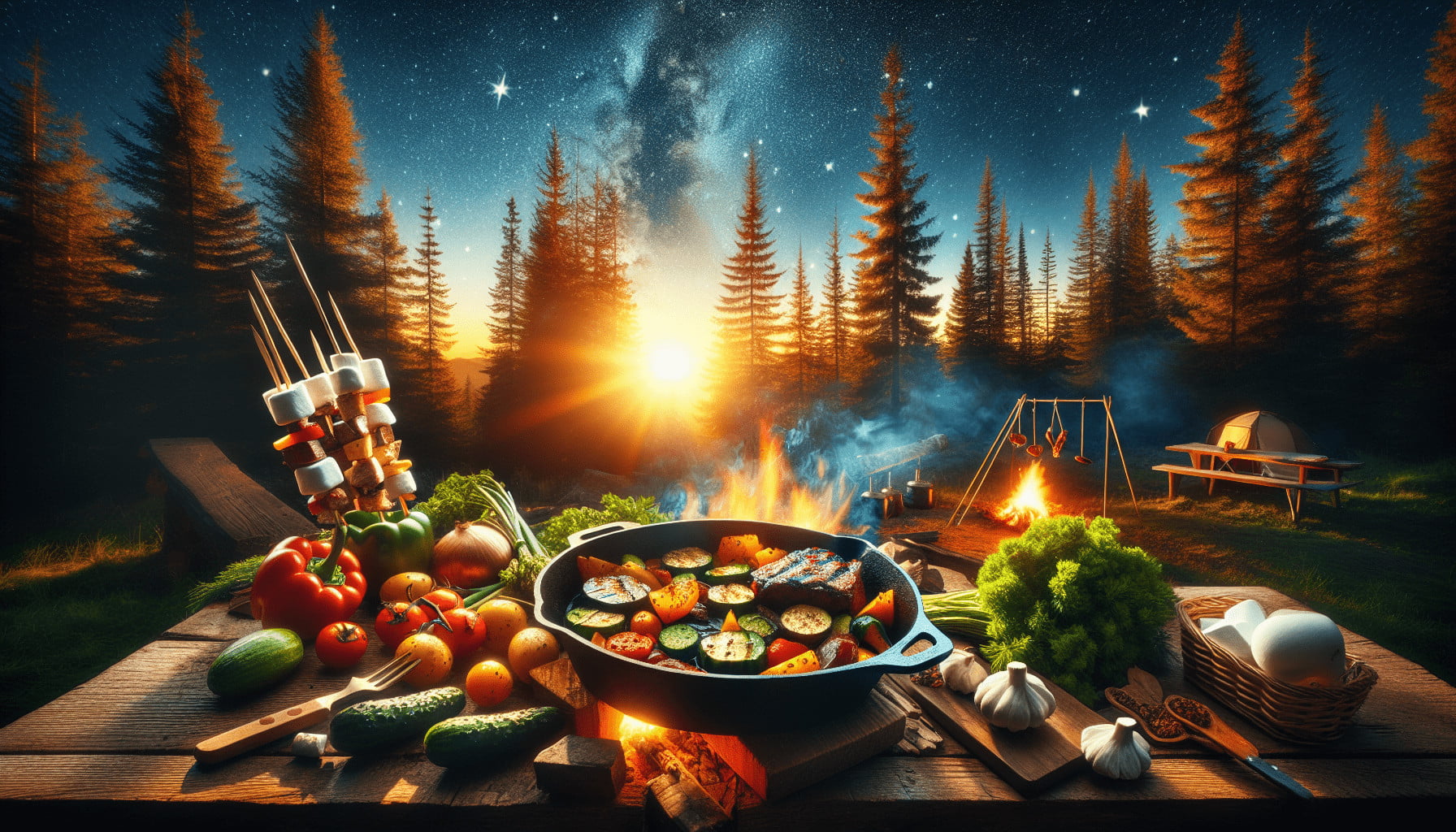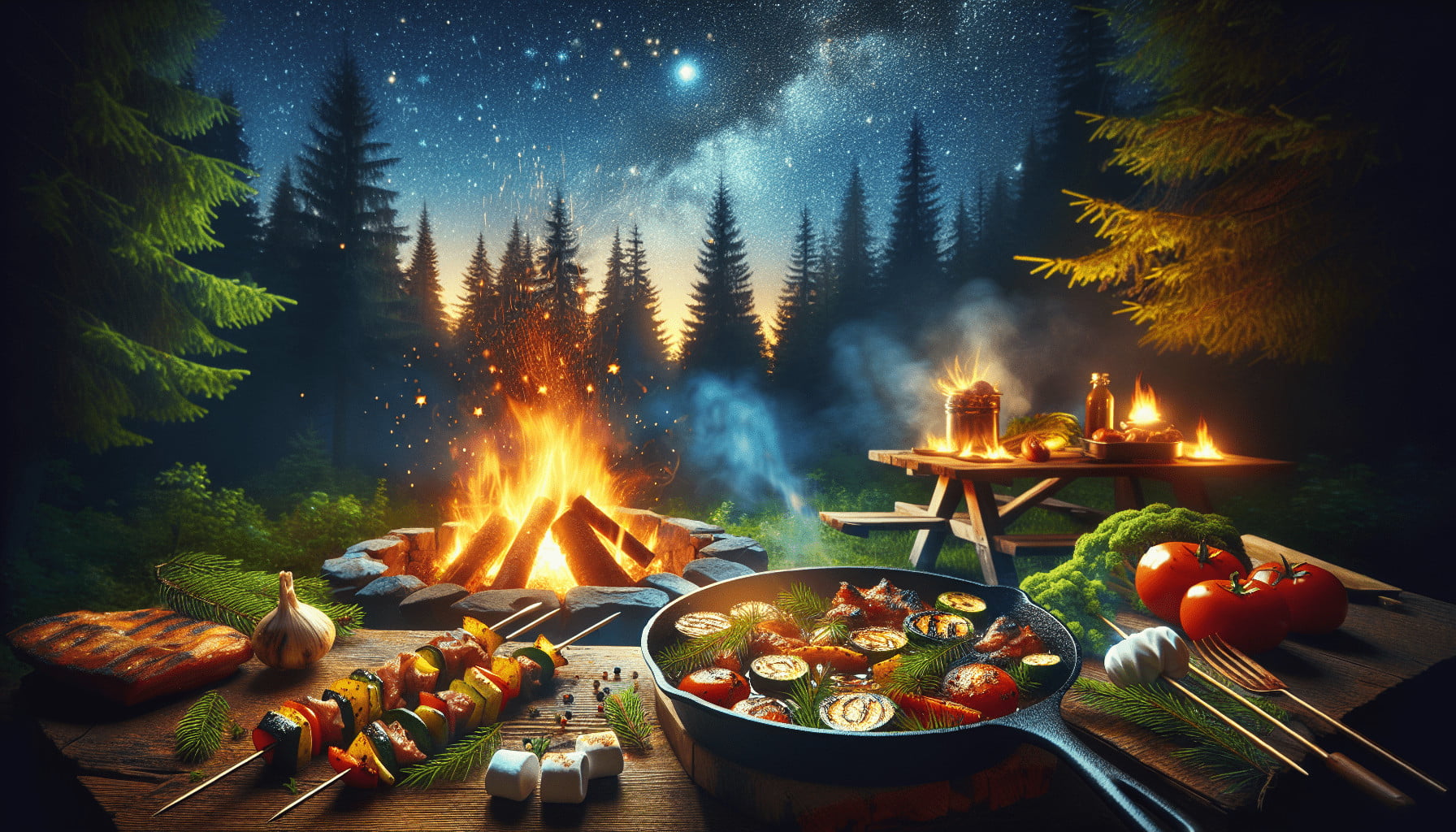Welcome to the “Beginner’s Guide to Campfire Cooking Like a Pro”! Imagine the crackling of the fire, the smell of wood smoke, and the satisfaction of crafting delicious meals right there in the great outdoors. This guide is your friendly companion, packed with simple tips and techniques to transform you from a camping rookie into a campfire culinary artist. You’ll discover easy recipes, learn about essential tools, and get expert advice on managing the flames, so your adventure in campfire cooking is both enjoyable and successful.
Whether you’re a camping newbie or a seasoned adventurer, learning to cook over a campfire can elevate your outdoor experience to a whole new level. In this guide, you’ll uncover the secrets to mastering campfire cooking like a pro.
Why Campfire Cooking?
Embrace the Adventure
Cooking over a campfire is not just about feeding yourself; it’s an adventure that tantalizes all your senses. The crackling fire, the smell of wood smoke, and the sound of nature all around you create an earthy setting that no indoor kitchen can replicate. Embracing campfire cooking adds a layer of excitement to your outdoor adventures, making mealtime something to look forward to.
Cultivate Skills & Self-Reliance
Learning to cook over a campfire is a valuable skill that will boost your confidence and self-reliance. It’s not as easy as turning a knob and adjusting the temperature; it requires a keen attention to detail, timing, and technique. By becoming proficient, you’ll not only impress your friends but also gain the ability to feed yourself gourmet meals even when modern conveniences are miles away.
Essential Gear
Fire-Starting Tools
Before you can cook, you need to get your campfire going. Here are some indispensable fire-starting tools:
| Tool | Function |
|---|---|
| Matches/Lighter | To ignite your tinder and kindling |
| Firestarter Cubes | Help in getting the fire started quickly |
| Tinder | Like dry leaves, newspaper, or cotton balls |
Cooking Utensils
Equip yourself with the right tools for cooking over a campfire:
| Utensil | Purpose |
|---|---|
| Cast Iron Skillet | Great for frying or sautéing |
| Dutch Oven | Perfect for slow-cooking and baking |
| Grill Grate | Enables direct grilling |
| Long-Handled Tongs | Keeps you a safe distance from the fire |
| Pot and Pan Set | Versatile for various cooking needs |
Safety Gear
While cooking over an open flame, safety should be your priority:
| Gear | Use |
|---|---|
| Fireproof Gloves | Protect your hands from heat and sparks |
| First Aid Kit | Essential for addressing minor burns or cuts |
| Fire Extinguisher | For emergency situations |

Building the Perfect Campfire
Selecting Your Firewood
Choosing the right type of wood can make all the difference:
| Type of Wood | Characteristics | Ideal For |
|---|---|---|
| Hardwoods | Burns slowly, produces hot coals | Long cooking times |
| Softwoods | Lights quickly, burns fast | Quick meals |
Fire Setup Methods
Understanding various fire setups can enhance your cooking experience:
| Method | Description | Best For |
|---|---|---|
| Teepee Fire | Arrange small sticks into a cone-like structure | Quick-heating meals |
| Log Cabin Fire | Stack logs in a square pattern | Longer-lasting fires, slow cooking |
Managing Your Fire
Maintaining the proper fire temperature is crucial for successful campfire cooking. Use a combination of large logs for longer-lasting heat and smaller sticks for quick bursts of flame. Adjust the placement of your cookware to control the cooking temperature—closer to the flame for searing, and farther away for simmering or slow cooking.
Cooking Techniques
Direct Heat Cooking
This method involves placing your food or cookware directly over the flames. It’s ideal for grilling meats, roasting vegetables, and toasting bread.
Grilling
Nothing beats the smoky flavor of foods grilled over an open flame. A simple grill grate can transform your campfire into a barbeque haven. Remember to preheat the grate and oil it lightly to prevent sticking.
Skewering
Using skewers, you can cook items like marshmallows, kabobs, and hotdogs uniformly. The rotation helps achieve thorough cooking and even browning.
Indirect Heat Cooking
This technique allows you to cook food slowly and evenly. The heat source is adjacent to, rather than directly under, the cooking area. It’s perfect for stews, soups, and baked goods.
Dutch Oven Cooking
A Dutch Oven is incredibly versatile, enabling you to roast, bake, and even make desserts. By placing hot coals on top and beneath the Dutch oven, you create an oven-like environment.
Foil Packet Cooking
Foil packets are a convenient and mess-free way to cook over a campfire. Wrap your ingredients in aluminum foil, place the packets on hot coals or a grill grate, and let them steam in their own juices.

Campfire Recipes to Try
Breakfast
Classic Bacon and Eggs
Ingredients:
- Bacon strips
- Eggs
- Salt and pepper
Instructions:
- Preheat your cast iron skillet over the campfire.
- Cook the bacon until crispy.
- Using the bacon grease, fry the eggs to your desired doneness.
- Season with salt and pepper.
Lunch
Campfire Grilled Cheese
Ingredients:
- Bread slices
- Butter
- Cheese slices
Instructions:
- Butter one side of each bread slice.
- Place cheese slices between the unbuttered sides of the bread.
- Cook on a grill grate over the campfire until the bread is golden brown and the cheese is melted.
Dinner
Dutch Oven Chili
Ingredients:
- Ground beef or turkey
- Chopped onions
- Diced tomatoes
- Beans (kidney or black beans)
- Chili seasoning
Instructions:
- Brown the ground meat in the Dutch oven.
- Add onions and cook until translucent.
- Stir in tomatoes, beans, and seasoning.
- Simmer for 30-40 minutes or until all flavors are well combined.
Dessert
Campfire S’mores
Ingredients:
- Graham crackers
- Marshmallows
- Chocolate bars
Instructions:
- Skewer a marshmallow and toast it over the fire until golden brown.
- Sandwich the marshmallow between two graham crackers with a piece of chocolate.
- Squeeze gently until the chocolate melts.
Tips and Tricks
Prepping Ahead
Prepping your ingredients before you head out can make campfire cooking more enjoyable and less chaotic. Chop vegetables, marinate meats, and measure out seasonings at home, and store them in zip-lock bags or airtight containers.
Temperature Control
Understanding the nature of fire and how to control its temperature can make a significant difference in your cooking. Make a habit of checking your food regularly to avoid burning and know when to add more wood or coals to maintain the ideal heat.
Use of Natural Elements
Nature provides plenty of tools that can aid in your campfire cooking. For instance, large flat stones can serve as makeshift hotplates, while sturdy tree branches can act as skewers.
Clean-Up and Safety
Proper Extinguishing
Just as you carefully built your campfire, it’s crucial to extinguish it properly. Douse the fire with water, stir the ashes, and douse again until everything is cold to the touch.
Leave No Trace
One of the golden rules of camping is to leave no trace. Pack out all your waste, including food scraps and packaging. Be mindful to leave your campsite as pristine as you found it or even better.
Safety Precautions
Always keep a bucket of water and a shovel nearby when cooking over an open flame. These tools can quickly address flare-ups or contain an unexpected fire. Never leave a campfire unattended and make sure to keep children and pets at a safe distance.
Conclusion
Learning to cook over a campfire is an enriching experience that combines the joys of the great outdoors with the satisfaction of creating delicious meals. With the right preparation, tools, and techniques, you can master the art of campfire cooking and impress yourself and your fellow campers. So, the next time you venture into the wild, don’t just settle for basic fare—elevate your campfire cooking game and eat like a pro.
Happy camping and bon appétit!
